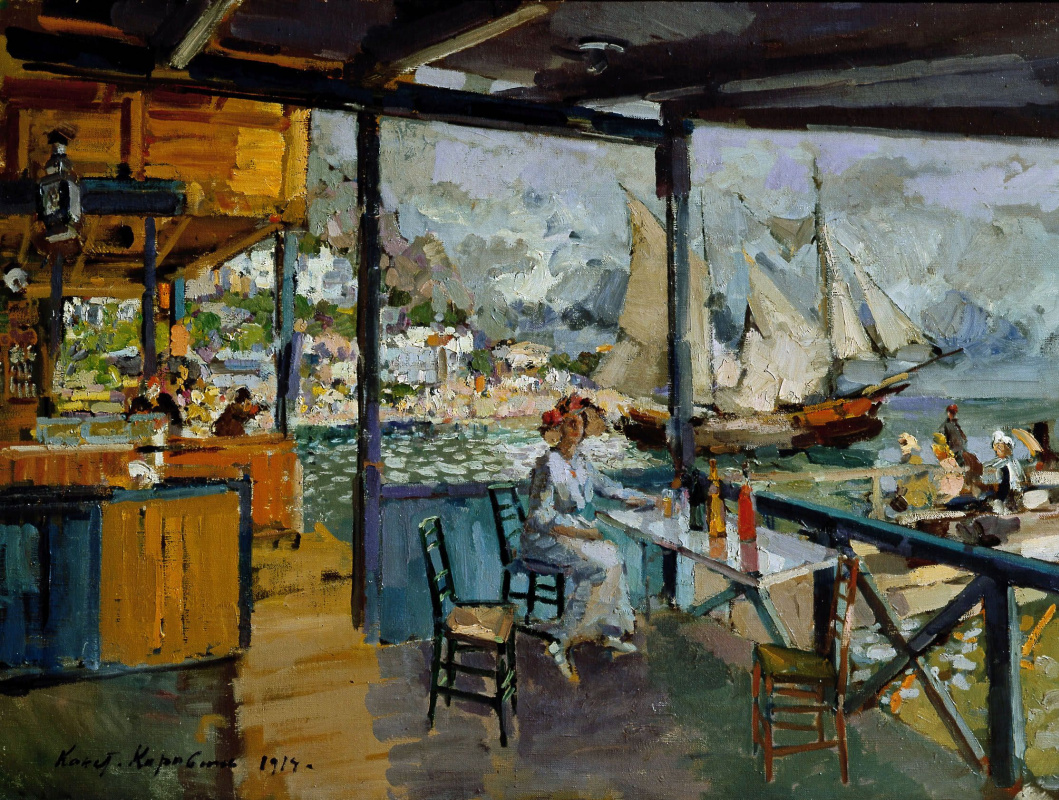log in
Enter site
Login to use Arthive functionality to the maximum
Pier in Gurzuf
Konstantin Korovin • Painting, 1914, 89×121 cm
Description of the artwork «Pier in Gurzuf»
Korovin painted the Pier in Gurzuf painting, like his other Crimean works of those years, after he and his family had moved to the Crimea. He was completely fascinated when he visited the place for the first time in the late 1880s together with Savva Mamontov. At the first opportunity, he bought a piece of land in Gurzuf by the sea, built there a house In Crimea, he painted well, so he often came there.
During the First World War, the reason for moving to the Crimean house was rather sad. There occurred an accident with his son Alexei. Then the artist himself was very ill. They decided to go to the Crimea to improve his health. Indeed, the climate and nature had a good effect on Korovin’s condition, inspiration returned to him, he worked hard. Crimean paintings of those years are the best examples of Korovin’s Impressionism.
The Pier in Gurzuf painting shows a girl at a table in an outdoor café on the pier. We can see a sailboat behind her. In the middle ground on the right are people on the shore. The colouring of the picture is magnificent. Konstantin Korovin often used the contrast of cold and warm tones in one image. The main contrast here is cool blue, purple and warm orange. These colours are used in the interior, they play in the outfit of the girl herself: the white and blue dress and warm colours of the hat, in objects placed on the table, in the outfits of people walking by the sea in the distance, in the sailboat itself and the landscape behind it. The roof of the café, which is made up of wide violet strokes interspersed with warm wooden beams, seems to be the sky gradually turning into a lighter “outside sky”. The light-air space outside the walls of the café amazes with subtle transitions of white, pink, lilac and blue tones. The picture is flooded with sunlight, its reflections illuminate the floorboards, play on the water and are seen in the smooth surface of the table. In this case, Korovin follows completely traditional principles of the Impressionists, making colour contrasts and light reflections the main subjects of his work. The Impressionist “random shot” rule is followed. And the subject matter seems to be the reason for the light rendering. The artist does not avoid black colour, while it fits perfectly into the general palette without making it heavy or dark.
The general mood of the picture is light, joyful, and sunny. Korovin worked with multidirectional strokes — somewhere they are wide, in other places are thick and frequent, the forms are all generalized, the space is shining, glittering. The varied texture of the image is tangibly reflected: glittering water ripples, the stretched sail density, the warmth of wooden materials, the heat of the sun outside and the shadow under the canopy. “Feeling the beauty of paint, light — this is what art is expressed in,” said Korovin and tried to achieve this effect in his works. Undoubtedly, he succeeded.
Written by Alyona Esaulova
During the First World War, the reason for moving to the Crimean house was rather sad. There occurred an accident with his son Alexei. Then the artist himself was very ill. They decided to go to the Crimea to improve his health. Indeed, the climate and nature had a good effect on Korovin’s condition, inspiration returned to him, he worked hard. Crimean paintings of those years are the best examples of Korovin’s Impressionism.
The Pier in Gurzuf painting shows a girl at a table in an outdoor café on the pier. We can see a sailboat behind her. In the middle ground on the right are people on the shore. The colouring of the picture is magnificent. Konstantin Korovin often used the contrast of cold and warm tones in one image. The main contrast here is cool blue, purple and warm orange. These colours are used in the interior, they play in the outfit of the girl herself: the white and blue dress and warm colours of the hat, in objects placed on the table, in the outfits of people walking by the sea in the distance, in the sailboat itself and the landscape behind it. The roof of the café, which is made up of wide violet strokes interspersed with warm wooden beams, seems to be the sky gradually turning into a lighter “outside sky”. The light-air space outside the walls of the café amazes with subtle transitions of white, pink, lilac and blue tones. The picture is flooded with sunlight, its reflections illuminate the floorboards, play on the water and are seen in the smooth surface of the table. In this case, Korovin follows completely traditional principles of the Impressionists, making colour contrasts and light reflections the main subjects of his work. The Impressionist “random shot” rule is followed. And the subject matter seems to be the reason for the light rendering. The artist does not avoid black colour, while it fits perfectly into the general palette without making it heavy or dark.
The general mood of the picture is light, joyful, and sunny. Korovin worked with multidirectional strokes — somewhere they are wide, in other places are thick and frequent, the forms are all generalized, the space is shining, glittering. The varied texture of the image is tangibly reflected: glittering water ripples, the stretched sail density, the warmth of wooden materials, the heat of the sun outside and the shadow under the canopy. “Feeling the beauty of paint, light — this is what art is expressed in,” said Korovin and tried to achieve this effect in his works. Undoubtedly, he succeeded.
Written by Alyona Esaulova


